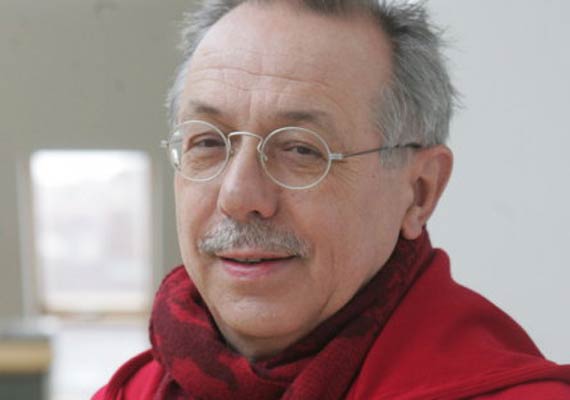Dieter Kosslick • Director, Berlin Film Festival
“Many filmmakers are investigating the causes of the refugee crisis”
- BERLIN 2016: Berlinale director Dieter Kosslick talks about the impact of worldwide globalisation, which is reflected in this year’s festival programme

Migration and turmoil are issues found in many of the movies at the 66th Berlin International Film Festival. Festival director Dieter Kosslick gives us a glimpse into the film programme, young talents and famous guests of honour.
Cineuropa: What are the main topics in the programme this year?
Dieter Kosslick: It deals with the right to, and search for, happiness. Recent topics such as the refugee crisis and migration also play a part, but they are not the main issues. Many filmmakers are investigating the causes. They are taking a look at the history of their countries and pointing out the consequences on the current situation. We are also showing various French films. This kind of nonchalance reminds me a little of the nouvelle vague, because these films are staging life with philosophical depth. Furthermore, we are celebrating the 30th anniversary of the Teddy Award. When the prize was created, gay people could still be arrested in Germany – this has already been forgotten.
Is it symptomatic of our time that people are being snatched away from their lives?
The term “security” can’t be limited to police security in terms of terrorism, because we are also experiencing the first big economic setback of globalisation. These are not only the consequences of complex territorial claims and economic interests in the Middle East; there are also countries in Africa as well as Afghanistan where people are migrating. The economic problems have been triggered by globalisation. That is the case in China. If a T-shirt is produced for two cents and someone else offers it for one cent, the companies will accept the latter offer. If the air is so polluted that nobody can step outside anymore, as in Beijing, the companies go to other countries. This completely unbridled pursuit of profit by corporations led to the first big setback – in film language, we call that a flashback. It simply can’t work if 63 rich people have as much as 3.2 billion poor people throughout the world. That didn’t work for Louis XIV, either.
The consequences of the global economy on humans are also a main subject in Tom Tykwer’s A Hologram for the King. Why is this film not being shown at the Berlinale?
We would have liked to present this film starring the great Tom Hanks at the Berlinale, but it didn’t work out in the end. It’s a real pity.
How strong is German cinema at the Berlinale?
This year, we have more than 70 German films from various genres in the official festival programme, from the German competition entry 24 Weeks [+see also:
film review
trailer
Q&A: Anne Zohra Berrached
film profile] by Anne Zohra Berrached, a study of a couple, through German co-productions such as Soy Nero [+see also:
film review
trailer
interview: Rafi Pitts
film profile] by Rafi Pitts and Alone in Berlin [+see also:
film review
trailer
film profile], to the works of young German filmmakers in the Perspektive. This will kick off with Aline Fischer’s Meteor Street [+see also:
trailer
film profile]. Furthermore, at this Berlinale, we are looking back to the film year 1966 in East and West Germany.
Does the Berlinale programme benefit from having filmmakers from initiatives such as the Berlinale Residency, the World Cinema Fund and Berlinale Talents?
About 100 talents from the last 13 years are involved in this year’s film programme. Among them is the Residency project Soy Nero in the competition and The Wounded Angel [+see also:
trailer
film profile] by former Berlinale talent Emir Baigazin in the Panorama. The Panorama is also presenting Time Was Endless [+see also:
trailer
film profile], which was supported by the World Cinema Fund, as well as In the Last Days of the City [+see also:
trailer
film profile] in the Forum. Our network is working.
A long-time Berlinale visitor is German DoP Michael Ballhaus, who will be awarded the Honorary Golden Bear. How has he shaped German film history?
His visionary work includes 130 films. His legendary 360-degree dolly shot in Martha by Rainer Werner Fassbinder became his trademark, so he also gained attention in the US. As a director of photography, together with Martin Scorsese, he created unique images for films such as Gangs of New York. In The Color of Money, he conveys the feeling that the viewer himself is a billiard ball. And in Air Force One, the small cabin looks like it was shot by the co-pilot. Michael Ballhaus is a great artist.
This year’s jury president, Meryl Streep, has already received an Honorary Golden Bear. She is very much into food and ecology. Will you be taking her to Culinary Cinema?
I am going to explain it to her, but I assume she already knows all about it because she is a close friend of Alice Waters’, a co-initiator of the “CuCi”, who was on our jury in 2009. She is the founder of Chez Panisse – a restaurant that serves seasonal, regional and sustainable food.
Did you enjoy reading this article? Please subscribe to our newsletter to receive more stories like this directly in your inbox.















